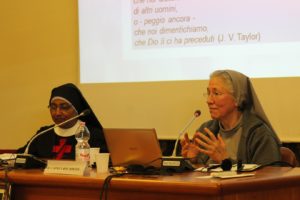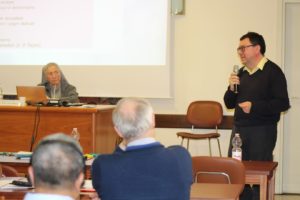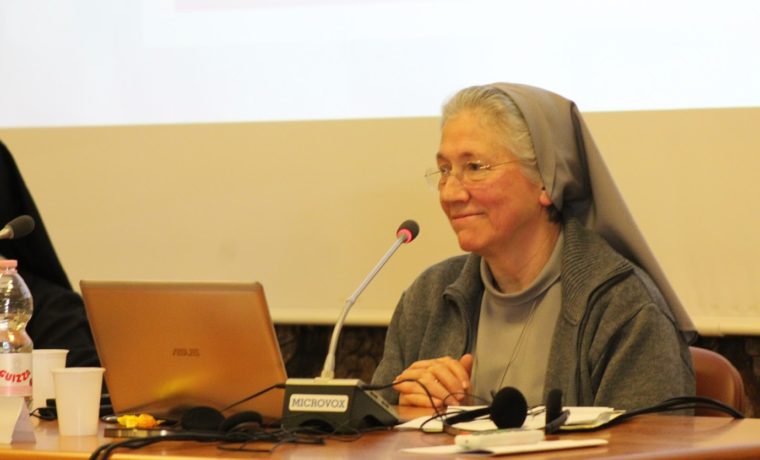Sr. Carmen Ros Norte, N.S.C.
Under-Secretary of the CIVCSVA
 The subject that was entrusted to me is ‘Relationships between us beyond all Frontiers: Interculturality’. To speak about interculturality is not easy; above all it is not easy to transmit attitudes more than ideas, to be open to the diverse, to grow together as a family, and to enrich ourselves with the riches of different cultures which our families welcome through our brothers and sisters and through the peoples to whom we are sent.
The subject that was entrusted to me is ‘Relationships between us beyond all Frontiers: Interculturality’. To speak about interculturality is not easy; above all it is not easy to transmit attitudes more than ideas, to be open to the diverse, to grow together as a family, and to enrich ourselves with the riches of different cultures which our families welcome through our brothers and sisters and through the peoples to whom we are sent.
Today, in a reality in which the whole world is putting up walls and barriers are created to impede entrance to those who are ‘diverse’ because of colour, culture or origins, we are invited to engage in prophetic gestures, bearing witness to the fact that it is possible to live together, albeit having different cultures and origins. Our communities, which are privileged settings for this witness, are called to be workshops of intercultural communion, models of mutual appreciation and welcome, with a mutual respect for differences, on a journey of communion and integration that works to eliminate the barriers that we erect every day amongst ourselves as well.
I will now proceed to a very short excursus on the reality of consecrated life today and the world in which it is placed because our communities are not extraneous to what is lived in today’s world, and perhaps are also strongly influenced by it.
Consecrated Life Located in the World
We live in a world of dehumanising poverty. The gap between the rich and the poor grows ever greater. It is shocking to learn that every day a fifth of the world’s population is hungry and that every 250 seconds a child dies because of a disease connected with water…There are very many victims of discrimination because of race, religion, sex…the number of devastated families is numberless.
We live in a world of conflicts and wars: conflicts that are often caused by geopolitical and territorial questions, sectarian and ethnic conflicts, forms of religious fundamentalism (Boko-Haram, AQMI, Al-Shabbaab, ISIS…) and by greed for rare and precious resources. Every year thousands of people die in armed conflicts and millions of people are forced out of their homes and become refugees…
Violence in the streets, in families, insecurity, juvenile delinquency, crimes and fear of terrorism are the order of the day and news about them fills the pages of newspapers and online newspapers on internet.
We live in a world of mega-migrations, of refugees and of asylum seekers: a migratory wave that escapes all controls…and leads to security laws that are anti-constitutional…The closing of frontiers provokes a humanitarian crisis…it increases xenophobia.
In this context, governments have lost the trust of populations because of numerous corruption scandals; financial restrictions are borne with difficulty and cuts to resources for welfare multiply. The middle class tends to disappear to the benefit of the rich. The lack of real leaders and the loss of credibility by mainstream parties make room for populist negative tendencies. The future of the European Union is at stake.
Fundamentalism is increasing: cultural, national and religious tensions increasingly make themselves felt, in particular diffidence in relation to Muslims and a fear of the advance of Islam, of Islamic fundamentalism and radicalism, increases Islamophobia.
Located in the world, consecrated life feels touched and called upon by this reality, by changes to, and the development of, a new culture that is being born.
In addition, we are going through a change of epoch, a change that will not take place and cannot take place over the next twenty-four hours and which bears upon many aspects of our lives: values, habits and customs, thought, theology…Today reality is very different to what it was even ten years ago. The world is experiencing a globalisation that affects all levels, a globalisation that with its consequences, which are also of a negative character…affects and influences the whole world.
This change of epoch has rapidly immersed us in a virtual world that was unknown a few years ago, but to which a whole generation already belongs. This requires serious formation because this virtual world has launched us into a new way of communicating, of living relationships, and calls upon us and opens up new pathways, but it is a world that is still unknown to a large number of people.
This change of epoch has also affected the religious culture in which Western society lived for centuries but which today has been replaced by a secularised culture that affects religious life in a severe way. Today the presence of other religions in a Europe that is prevalently Christian has inverted equilibriums and inter-religious dialogue has become an essential requirement for peace; deChristianisation is proceeding apace. Almost everywhere we are witnessing a ‘religious desertification’: not only a decrease in religious practice but also controversies regarding the great ethical questions of the end of life, euthanasia and assisted procreation.
The scandals in the Church have contributed to disillusionment with religion and a sort of phobia towards Christianity that is felt by involved lay people and the media.
Despite this, the thirst for spirituality has never disappeared, although it is no longer looked for and quenched in traditional settings and on traditional pathways. We are asked to have new ways of being present and new styles of evangelisation.
Inside our Congregations we are experiencing these challenges of the world, as well as the challenges specific to consecrated life today.
Are we able to welcome these challenges as opportunities that open up new roads for us and invite us to respond to the provocations of this new culture which often shakes us? Is this not what our men and women founders did? They contemplated the reality of their times, they felt the thirst of their contemporaries, and, opening themselves up to the action of the Spirit, they provided a response. Today we are called to embody the Good News in this change of epoch with concrete and prophetic gestures, as Pope Francis has suggested to us.
Is not bearing witness to living together, even though we are diverse; uniting ourselves and placing our capacities for mission in common; and taking part in the building up of the Kingdom, together, consecrated men and women and lay people, respecting and welcoming the gifts of each one us, perhaps one of these prophetic and concrete gestures in a society where so many people look for nothing else but gain for themselves?
Today we are invited to reinvent our way of living mission in an intercultural context in order to meet the challenges of a globalised world that increasingly leaves people at the side of the road.
‘Intercultural life’ is an important expression of global solidarity in our intercultural world. In the view of Fr. Antony Gittins, CSSP, an expert in practical and theoretical studies on interculturality, ‘intercultural existence is a school of authentic discipleship lived culturally by different people together. It is not easy but it is urgent and necessary…it is the future of international consecrated life. If international communities do not become intercultural they will not survive’.
 The witness of an intercultural community can play a crucial role in the process of reconciliation and healing of the poor, of refugees, of people who live in shanty towns, and of all those who are obliged to live in a multicultural and multi-religious reality. The witness of a harmonious life within cultural, social and religious conflicts is really a visible and credible sign of the Kingdom of God. Ongoing formation for intercultural life must become a priority for us all.
The witness of an intercultural community can play a crucial role in the process of reconciliation and healing of the poor, of refugees, of people who live in shanty towns, and of all those who are obliged to live in a multicultural and multi-religious reality. The witness of a harmonious life within cultural, social and religious conflicts is really a visible and credible sign of the Kingdom of God. Ongoing formation for intercultural life must become a priority for us all.
Today we live in a world that has passed from the ‘mono’ (mono-cultural) to the ‘multi’ and the ‘inter’: inter-national, inter-cultural, inter-relational, inter-Congregational. In such a world, which is full of risks and unknowns, no person, no institution, no Congregation and no community can seek to construct the future with its own forces alone. Instead, this construction passes by way of courage and the humble patience of encounter in truth, of dialogue, of listening, of sharing resources, and of mutual help. ‘Very many Congregations, and especially ones for women, have begun to give priority to foundations in young Churches and have passed from situations that were almost only mono-cultural to the challenge of multiculturality’.[1]
[1] CIVCSVA, Per vino nuovo otri nuovi. Dal Concilio Vaticano II la vita consacrata e le sfide ancora aperte, Orientamenti (LEV, 2017), p. 25.















Camillians on Facebook
Camillians on Twitter
Camillians on Instagram